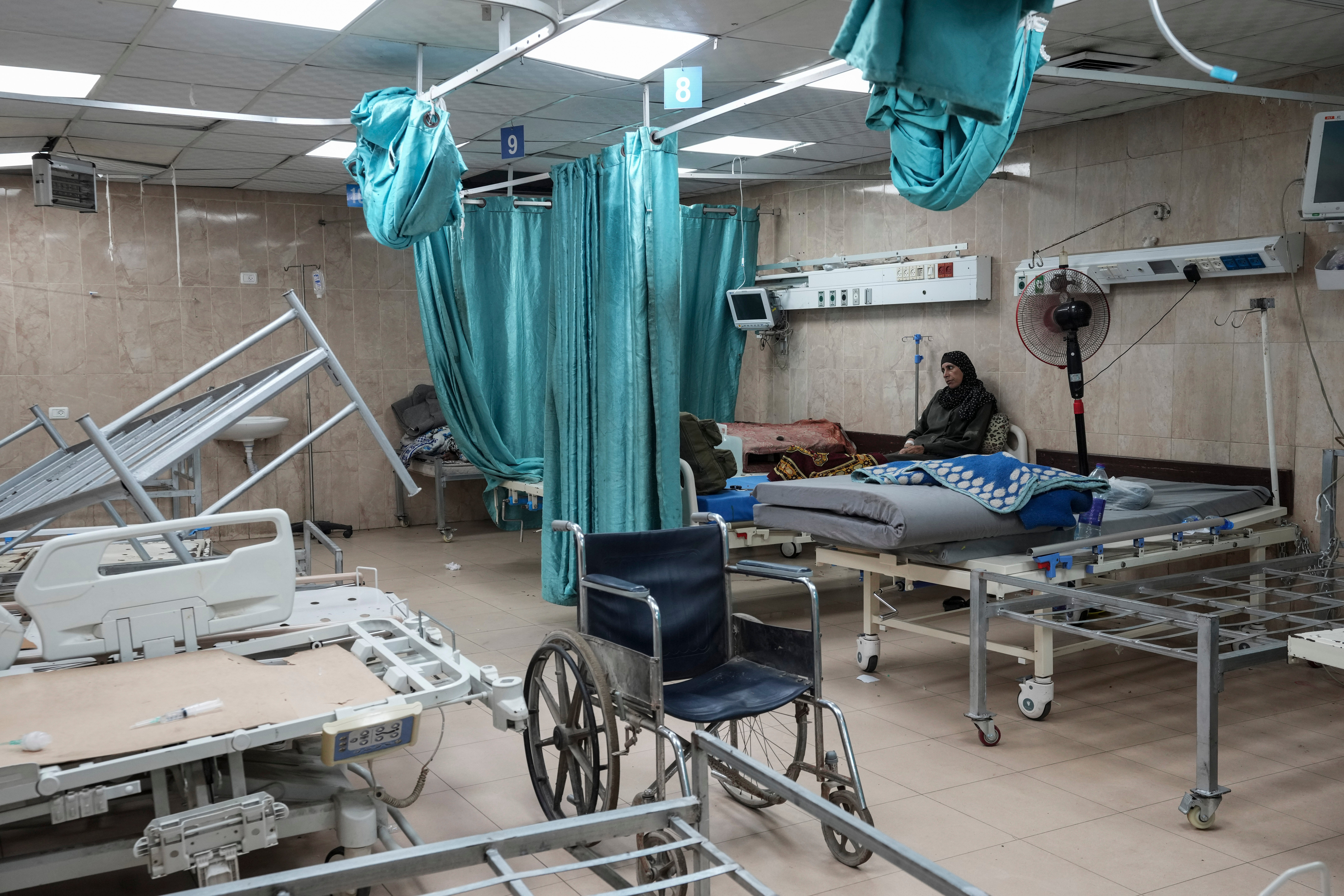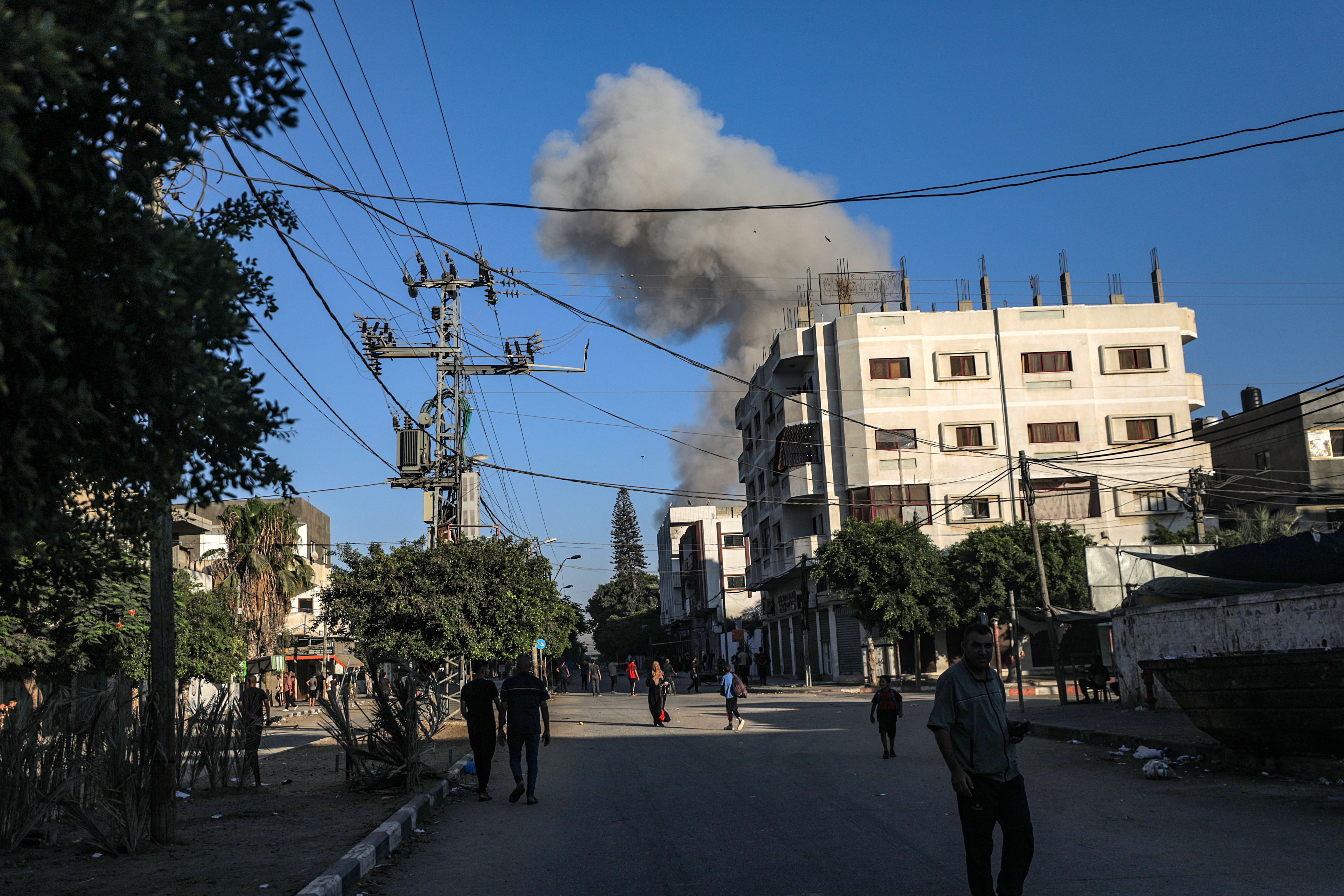UN aid operations ‘paused’ in Gaza as Israeli offensive continues and ceasefire talks stall
‘The space to operate is being restricted more and more than ever,’ senior UN official warns
Support truly
independent journalism
Our mission is to deliver unbiased, fact-based reporting that holds power to account and exposes the truth.
Whether $5 or $50, every contribution counts.
Support us to deliver journalism without an agenda.

Louise Thomas
Editor
The United Nations has been forced to halt its humanitarian aid operations in Gaza, a senior official has warned, after Israel issued new evacuation orders for the city of Deir al-Balah.
As the latest round of high-level talks for a ceasefire in the 10-month war – sparked by Hamas’s incursion into Israel on 7 October – ended without a final agreement on Sunday, Israel issued yet another evacuation order in a part of Deir al-Balah it said was now “considered a dangerous combat zone”.
City authorities say 250,000 people have so far been displaced there in recent weeks, with families forced to sleep without shelter on roads and the nearby beach, as the UN warned of an 85 per cent shortfall in water due to just three out of the city’s 18 wells remaining operational.

And a senior UN official, speaking anonymously to Reuters on Monday, warned that, “as of this morning, we’re not operating in Gaza” to deliver humanitarian aid because “we’re unable to deliver today with the conditions that we’re in”.
“We’re not leaving [Gaza], because the people need us there,” the official said, adding that staff on the ground have been directed to try and find a way to keep operating.
“We’re trying to balance the need of the population with the need for safety and security of the UN personnel.”
The UN previously relocated its main command operations for the Gaza Strip and most personnel to Deir al-Balah after Israel ordered the evacuation of Rafah, they said, adding: “Where do we move now? ... The space to operate is being restricted more and more than ever.”
One Palestinian woman said she and her children had now been displaced 11 times.
“I left half of my children behind me near my furniture and I am now with my little ones and my daughter. Only God can help us ... I have no money for transportation, I will go to area 17 where my family is staying on my foot. I took my kids and three are left behind. No idea where,” the woman said.

The new orders have forced many families and patients to leave Al-Aqsa Hospital, the main medical facility serving central Gaza, where hundreds of thousands of residents and displaced people had taken shelter, for fear of bombardments.
While Israel said it had informed health officials that the facilities did not need to be evacuated, the hospital is close to the area covered by the evacuation notice, and people could be seen fleeing the hospital and surrounding areas on Monday, with some pushing patients on stretchers or carrying sick children.
“Our fate is to die,” a woman named Fatimah al-Attar told the Associated Press as she left the hospital compound. “There is no place for us to go. There is no safe place.”
Doctors Without Borders (MSF) said an explosion around 250 metres from the hospital on Sunday had accelerated the exodus.
“As a result, MSF is considering whether to suspend wound care for the time being, while trying to maintain life-saving treatment,” the charity said.
The hospital said it was treating more than 600 patients before the evacuation orders. Only around 100 patients remained on Monday, including seven in intensive care and eight in the children’s ward.

As Israel’s offensive continued, a US official said four days of high-level talks for a ceasefire and deal to return Israeli hostages seized on 7 October had ended in Cairo without a final agreement. But talks will continue at lower levels in the coming days in an effort to bridge remaining gaps.
A senior US official described the talks as “constructive” but Hamas official Osama Hamdan criticised those remarks as false and intended to boost electioneering in the upcoming presidential ballot. Hamas said it rejected new conditions made by Israel during the talks.
The development came after Israel and the Lebanese militant group Hezbollah traded heavy fire early on Sunday but backed off from sparking a widely feared all-out war, as both sides signalled that their most intense exchange in months was over.
Hezbollah claimed to hit an Israeli military intelligence site near Tel Aviv as part of a barrage of hundreds of rockets and drones, and Israel claimed its dozens of strikes had been pre-emptive to avert a larger attack. Neither offered evidence.
Hezbollah leader Hassan Nasrallah said the attack, a response to Israel’s killing of a top militant commander in Beirut last month, had been delayed to give the Gaza ceasefire talks a chance, and so fellow Iran-backed groups could discuss with Iran whether to attack Israel all at once.
He said Hezbollah will “reserve the right to respond at a later time” if the results of Sunday’s attack aren’t sufficient. He added that allied Houthi rebels in Yemen – and Iran itself – had yet to respond. But he told the Lebanese people: “At this current stage, the country can take a breath and relax.”
Israeli premier Benjamin Netanyahu said the military eliminated thousands of rockets that were aimed at northern Israel and shot down drones heading for the centre of the country, adding: “I repeat – this is not the end of the story.”
Israeli government spokesperson David Mencer said Hezbollah had suffered a “crushing blow” from the Israeli strikes but warned that the current situation of tens of thousands of Israelis being evacuated from their homes “is not sustainable”, vowing Israel would return its population to its sovereign territory.
Additional reporting by agencies
Subscribe to Independent Premium to bookmark this article
Want to bookmark your favourite articles and stories to read or reference later? Start your Independent Premium subscription today.

Join our commenting forum
Join thought-provoking conversations, follow other Independent readers and see their replies
Comments